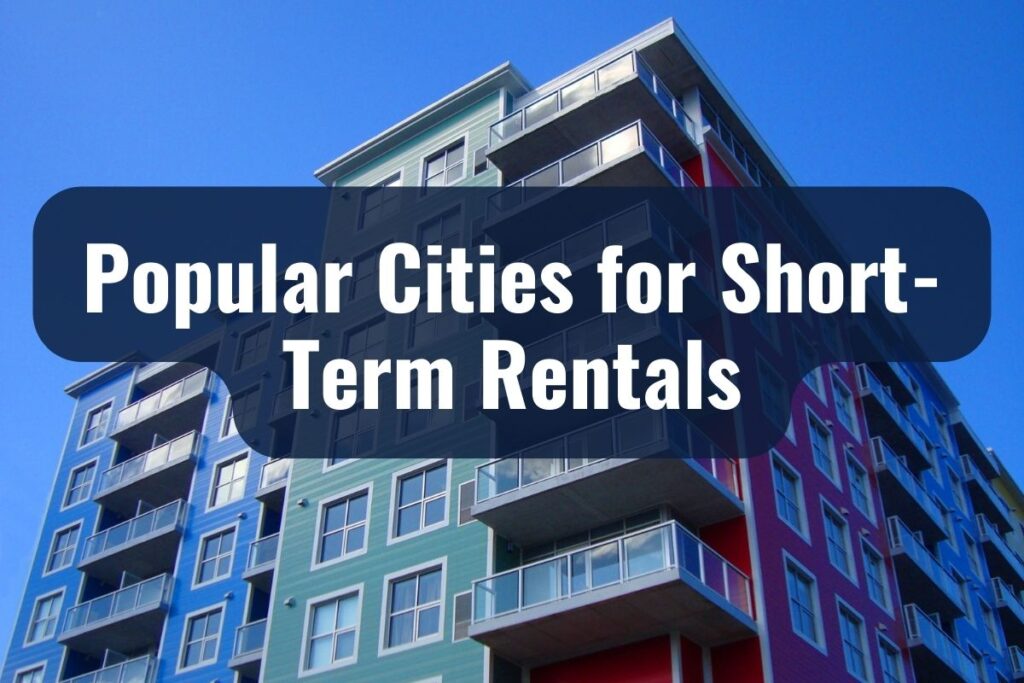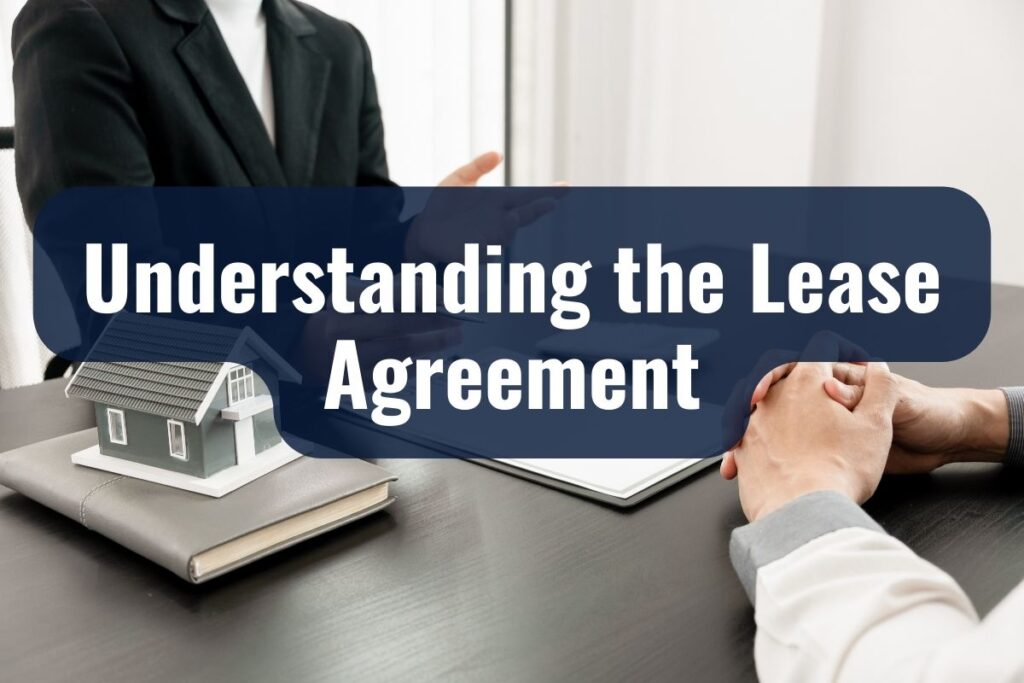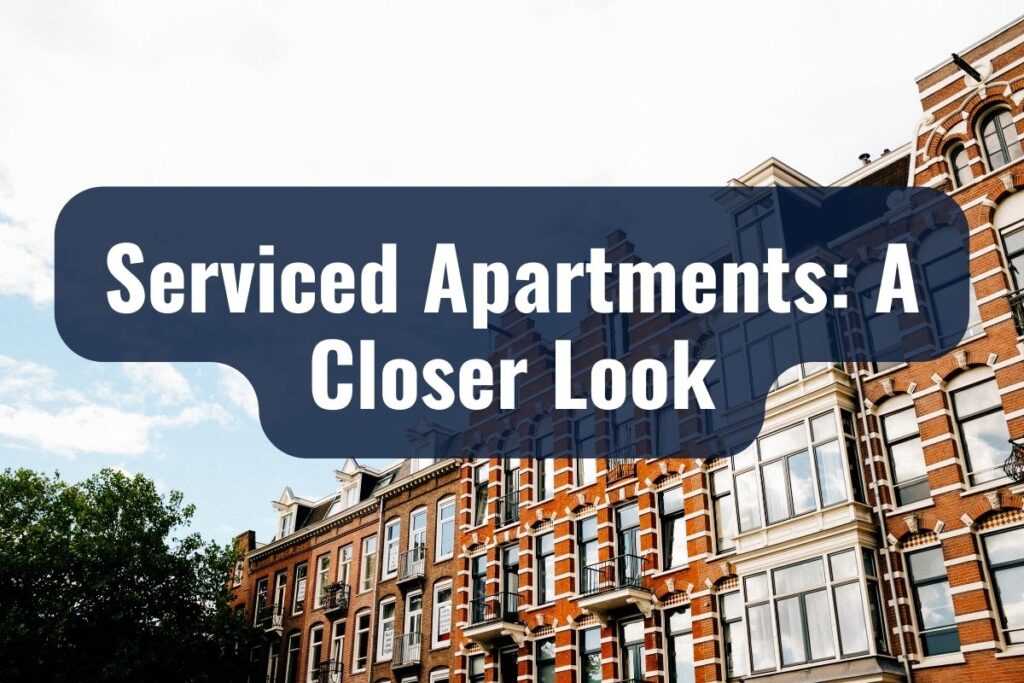The Netherlands has become a popular destination for foreigners, be it for work, study, or leisure. But while the country’s charm is undeniable, the practicalities of living here, especially when it comes to finding the right accommodation, can be a tad overwhelming. Enter short-term rentals and serviced apartments — the go-to solution for many foreigners seeking temporary yet comfortable living arrangements.
For those new to the Dutch housing market, distinguishing between the two, understanding lease agreements, or even just knowing where to start searching can be daunting.
This article is designed to simplify that process. Whether you’re in the country for a few months or considering a longer stay, this guide will provide essential insights into securing short-term rentals and serviced apartments in the Netherlands.
Key Takeaways:
- Short-term rentals and serviced apartments in the Netherlands cater specifically to the needs of foreigners seeking temporary accommodation.
- Popular Dutch cities offer diverse rental experiences, with Amsterdam typically being the priciest.
- Thorough research and understanding lease agreements are vital for a successful rental process.
- Serviced apartments provide a harmonious blend of home comforts and hotel-like amenities.
- Awareness of costs, rights, and local regulations ensures a hassle-free stay in the Netherlands.
Benefits of Short-Term Rentals and Serviced Apartments in the Netherlands
When choosing a place to stay in the Netherlands, especially as a foreigner, the decision between traditional accommodations and more flexible options like short-term rentals and serviced apartments can be pivotal. These temporary housing solutions offer a range of advantages that cater to the unique needs and preferences of foreigners in the country. Let’s delve into the key benefits that make these choices so appealing:
Flexibility and Convenience
One of the prime advantages of short-term rentals is the flexibility they offer. Unlike traditional leases that often require a minimum one-year commitment, short-term rentals can be secured for weeks or even just a few months. This is especially beneficial for those on short work contracts, exchange programs, or extended vacations.
Fully Furnished Spaces
Most short-term rentals and serviced apartments come fully furnished, eliminating the hassle of buying or moving furniture. This not only eases the settling-in process but also reduces initial costs.
Amenities and Services Included
Serviced apartments, in particular, often come with a suite of amenities that can rival any upscale hotel. This could include regular cleaning, laundry services, fitness centers, and even concierge services. Such perks can significantly enhance the living experience, especially for those unfamiliar with the local language and practices.
No Long-Term Commitment
Not sure how long you’ll be staying? These accommodations provide the freedom to move without the baggage of long-term lease agreements. If plans change, or if you simply want to explore a different part of the Netherlands, transitioning becomes a lot smoother.
Cultural Immersion
Unlike staying in a hotel, living in a rented apartment allows for a more authentic experience. It offers an opportunity to live like a local, shop from neighborhood stores, and engage with the community, making the stay culturally enriching.
Cost-Effective in the Long Run
While serviced apartments might come with a higher monthly rental than unfurnished apartments, the inclusion of services, utilities, and furnishings often makes them a cost-effective choice in the long run. There’s no need to invest in furniture, household items, or separate service providers, which can quickly add up.
Popular Cities for Short-Term Rentals

The Netherlands, though a small country, boasts a diverse array of cities, each with its own unique character, history, and appeal. For foreigners, selecting the right city for short-term accommodation can play a significant role in shaping their Dutch experience. Here’s a look at some of the most sought-after cities for short-term rentals:
Amsterdam
As the capital city and a major global hub, Amsterdam naturally tops the list. Renowned for its historic canals, iconic museums, and vibrant nightlife, the city is a magnet for tourists, professionals, and students alike. Short-term rentals in Amsterdam are diverse, ranging from cozy canal-side apartments to modern lofts in bustling neighborhoods.
Rotterdam
Known for its modern architecture and bustling port – the largest in Europe – Rotterdam offers a mix of the contemporary with a touch of maritime charm. The city’s rejuvenated areas, such as the Cube Houses (Kubuswoningen) and Markthal, offer unique rental opportunities for those seeking something out of the ordinary.
Utrecht
A harmonious blend of ancient and modern, Utrecht is famous for its central location and beautiful canals with their characteristic wharf cellars. Its compact city center is dotted with medieval structures, making it a picturesque location for short-term stays.
The Hague (Den Haag)
As the seat of the Dutch government and home to numerous international organizations, The Hague offers a mix of cultural richness and cosmopolitan flair. The city’s seaside location and historical monuments, combined with its status as an international city of peace and justice, make it a preferred choice for diplomats, professionals, and tourists.
Eindhoven
Dubbed the “Silicon Valley of the Netherlands,” Eindhoven is a hotspot for innovation and technology. The city, home to the renowned Technical University of Eindhoven and several multinational tech companies, offers a range of modern accommodations suitable for students, tech professionals, and entrepreneurs.
Each of these cities, with its distinctive allure, caters to a wide range of preferences. Whether one is looking for cultural immersion, a bustling urban experience, or proximity to innovation hubs, the Netherlands’ cities offer short-term rental options that can match varied aspirations and lifestyles.
Searching for Short-Term Rentals in the Netherlands
Navigating the rental market in a foreign country can often be a complex endeavor. With language barriers and unfamiliar housing norms, the process might seem daunting. However, armed with the right knowledge and tools, finding a suitable short-term rental in the Netherlands can be both efficient and rewarding. Here’s a guide to ease your search:
Recommended Websites and Platforms
A good starting point is to explore trusted platforms that cater to the rental market:
- Pararius: An extensive platform with a range of properties across the Netherlands, Pararius offers detailed property descriptions, photos, and often includes virtual tours.
- Funda: Originally designed for buying properties, Funda also has a comprehensive rental section. It’s user-friendly and offers filters that can help narrow down options based on specific requirements.
- HousingAnywhere: Specifically targeting students and young professionals, HousingAnywhere connects potential tenants with landlords and often includes short-term and medium-term options.
Tips for Safe Online Searching
In the digital age, while there are many conveniences, there are also pitfalls. Here are some guidelines to ensure a safe online property search:
- Avoid Upfront Payments: Be wary of landlords or agencies demanding substantial payments before you’ve viewed the property or signed any agreements.
- Meet in Person: If possible, arrange to view the property in person before finalizing any deal. Virtual tours are handy, but an in-person visit gives a genuine feel for the place.
- Check Reviews and Recommendations: If you’re dealing with an agency or a listing on a shared platform, look for reviews or testimonials from previous tenants.
- Beware of Too-Good-To-Be-True Offers: Exceptionally low prices or offers that seem out of sync with the local market should be approached with caution. They might be indicative of potential scams.
- Engage with Expatriate Communities: Interacting with fellow expats can offer valuable insights. Online forums, social media groups, or local community gatherings can be great platforms to seek recommendations, understand potential challenges, and even discover direct listings from landlords.
Understanding the Lease Agreement

Securing a rental property is more than just finding the right place; it’s about ensuring that the terms of stay are clear, fair, and mutually agreed upon. The lease agreement is the binding document that stipulates these terms. For foreigners in the Netherlands, navigating a Dutch lease agreement might appear challenging, especially given potential language barriers. Here’s a guide to help you understand and navigate the intricacies of such contracts:
Key Terms Often Found in Dutch Rental Contracts
Huurprijs: This refers to the rent price. It’s crucial to confirm whether this amount includes utilities like water, electricity, and internet or if they are charged separately.
Borg: This is the security deposit. Typically, this is equivalent to one or two months of rent and is returned at the end of the lease, provided there are no damages or outstanding payments.
Opzegtermijn: This term refers to the notice period. It indicates the time frame (usually a month) that a tenant or landlord must provide before terminating the lease.
Onderhuur: This pertains to subletting. Most rental agreements in the Netherlands prohibit subletting, but it’s essential to check.
English Contract or Reliable Translation
While many landlords, especially in larger cities, provide English versions of rental agreements, it’s not a given. If the contract is solely in Dutch, consider getting it translated by a professional or using reliable translation software. Always ensure you understand every clause before signing.
Rights and Responsibilities
Maintenance: Understand who is responsible for various maintenance tasks. Typically, minor repairs and upkeep are the tenant’s responsibility, while major repairs fall on the landlord.
Registration: In the Netherlands, it’s mandatory for residents to register at their local municipality (gemeente). Ensure that the lease permits this registration.
Rent Increases: Rental contracts should outline the conditions under which the rent can be increased and the notice period required for such an increase.
Seek Expert Advice
If any terms seem unclear or dubious, don’t hesitate to seek expert advice. There are various expatriate services and legal consultants in the Netherlands who can assist foreigners in understanding rental agreements.
Costs and Pricing
For foreigners seeking short-term rentals, understanding the financial aspect is crucial to ensure a stay that aligns with one’s budget and preferences. Here’s an overview of the essential cost components and pricing trends you should consider:
| City | Description |
| Amsterdam | Capital city with highest rental costs; premium prices in central areas. |
| Rotterdam & The Hague | Major cities with diverse price ranges; generally more affordable than Amsterdam. |
| Utrecht & Eindhoven | Dynamic rental market influenced by universities and city centers; varying prices. |
Average Costs for Different Cities
Amsterdam: Being the capital and a major tourist attraction, Amsterdam typically has the highest rental costs. Central areas can command premium prices, while suburban zones might offer more competitive rates.
Rotterdam & The Hague: As major cities, both Rotterdam and The Hague have a broad price range, but rentals are generally more affordable than Amsterdam.
Utrecht & Eindhoven: With a balance of urban life and academic presence, these cities have a dynamic rental market. Prices can vary based on proximity to universities and city centers.
Security Deposit Considerations
Typically, the security deposit for short-term rentals is equivalent to one or two months’ rent. This deposit serves as a safeguard for the landlord against damages or unpaid rents. Ensure that the return conditions are clearly defined in the lease agreement.
Utility and Service Charges
Inclusions: Always clarify what’s included in the rent. Sometimes utilities like electricity, water, and internet are part of the monthly fee. In other cases, they might be separate.
Serviced Apartments: Given that they offer additional amenities, serviced apartments might have a slightly higher rental cost. However, they often include services like cleaning, laundry, and sometimes even utilities in the package, offering value for money.
Additional Costs
Agency Fees: If you’re securing a rental through an agency, they might charge a fee. This is usually a percentage of the monthly rent or a fixed amount.
Tourist Tax: Some municipalities impose a tourist tax on short-term rentals, especially if the stay is less than four months. This is an additional charge and varies from one municipality to another.
Negotiations: While rental prices are often fixed, there’s no harm in discussing or negotiating, especially if you’re committing to a longer stay or if the property has been on the market for an extended period.
Serviced Apartments: A Closer Look

For many foreigners navigating the housing market in the Netherlands, serviced apartments emerge as an intriguing option. Combining the comforts of a home with the amenities of a hotel, they present a blend that is both practical and luxurious. But what exactly are serviced apartments, and what makes them so appealing to a transient audience? Let’s delve deeper into their offerings and benefits.
Defining Serviced Apartments
Nature: Serviced apartments are fully furnished accommodations that offer services typically associated with hotels. They are designed for medium to long-term stays, making them a preferred choice for many expatriates, business travelers, and extended vacationers.
Space: Unlike a standard hotel room, serviced apartments often include separate living, sleeping, and cooking areas, providing a more homely environment.
Range of Services Offered
Housekeeping: Regular cleaning services, often on a weekly or bi-weekly basis, ensure a tidy living space without the hassle of personal maintenance.
Laundry: Many serviced apartments include laundry services or facilities, easing the burden of this routine chore.
Concierge and Reception: Similar to hotels, these apartments often come with a front desk or concierge service, assisting residents with various needs, from mail collection to local recommendations.
Advantages Over Traditional Rentals
Move-in Ready: Serviced apartments are fully furnished, reducing the need for any immediate investment in furniture or household items.
Utility Integration: Bills for water, electricity, and sometimes even the internet are often included in the rent, simplifying payment processes.
Flexibility: Given their target audience, serviced apartments typically have more flexible lease terms, allowing for shorter commitments than traditional rentals.
Safety and Security: Many serviced apartments prioritize safety with features like 24/7 security, CCTV cameras, and secure access systems.
Potential Drawbacks
Cost Implications: The inclusive services and amenities can make serviced apartments more expensive on a monthly basis compared to standard rentals. However, when you factor in the value of the provided services, the cost might be justifiable for many.
Less Personalization: Since the apartments are designed to cater to a broad audience, there might be limitations on personalizing or modifying the space.
Ideal For
Business Travelers: Those on extended work assignments can benefit from the mix of home-like comforts and hotel-like services.
Relocating Families: Before settling into a more permanent residence, families new to the Netherlands might find serviced apartments a convenient transitional space.
Extended Vacationers: Travelers looking to immerse themselves in the local culture for several weeks or months may prefer the homely feel of serviced apartments over hotels.
Tips for a Smooth Rental Experience
Embarking on a rental journey in a foreign country can be both exhilarating and challenging. The Netherlands, with its structured rental market and welcoming atmosphere, is no exception. While the process is relatively streamlined, certain tips can enhance your experience, ensuring a hassle-free stay. Here are some key insights to guide you through your rental adventure in the Netherlands:
- Start Early:
- The rental market, especially in popular cities like Amsterdam and Utrecht, can be quite competitive. Begin your search well in advance to ensure you have ample options to choose from and can secure a place that suits your preferences.
- Document Preparedness:
- Ensure you have all essential documents at hand, such as your passport, employment contract, and recent pay slips. Being organized can expedite the rental process and make a positive impression on potential landlords.
- Understand Your Rights:
- Familiarize yourself with tenant rights in the Netherlands. For instance, landlords cannot force eviction without proper legal grounds, and rent increases are often regulated.
- If facing issues, you can approach the “Huurcommissie” (Rent Tribunal) to mediate disputes related to rent and living conditions.
- Inspect Thoroughly:
- When viewing potential properties, don’t rush. Check for any damages, ensure appliances work, test the water pressure, and inspect windows and doors. Addressing issues before moving in can save future inconveniences.
- Communication is Key:
- Establish open communication with your landlord. Whether it’s about repairs, questions related to utilities, or potential changes in the lease duration, clarity and timely dialogue can foster a harmonious landlord-tenant relationship.
- Local Integration:
- Immersing yourself in the local community can be immensely beneficial. Neighbors can offer insights into communal regulations, garbage disposal routines, and even introduce you to nearby amenities.
- Stay Informed on Local Regulations:
- Some municipalities have specific rules for waste disposal, recycling, and even parking. Familiarizing yourself with these can help in avoiding unintentional violations or fines.
- Exit Gracefully:
- When it’s time to leave, ensure you hand over the property in the same condition as you received it, accounting for normal wear and tear. Properly ending one rental experience on a positive note can also serve as a solid reference for future rentals.